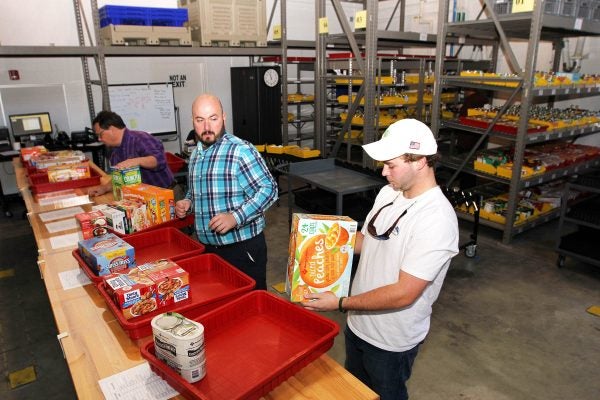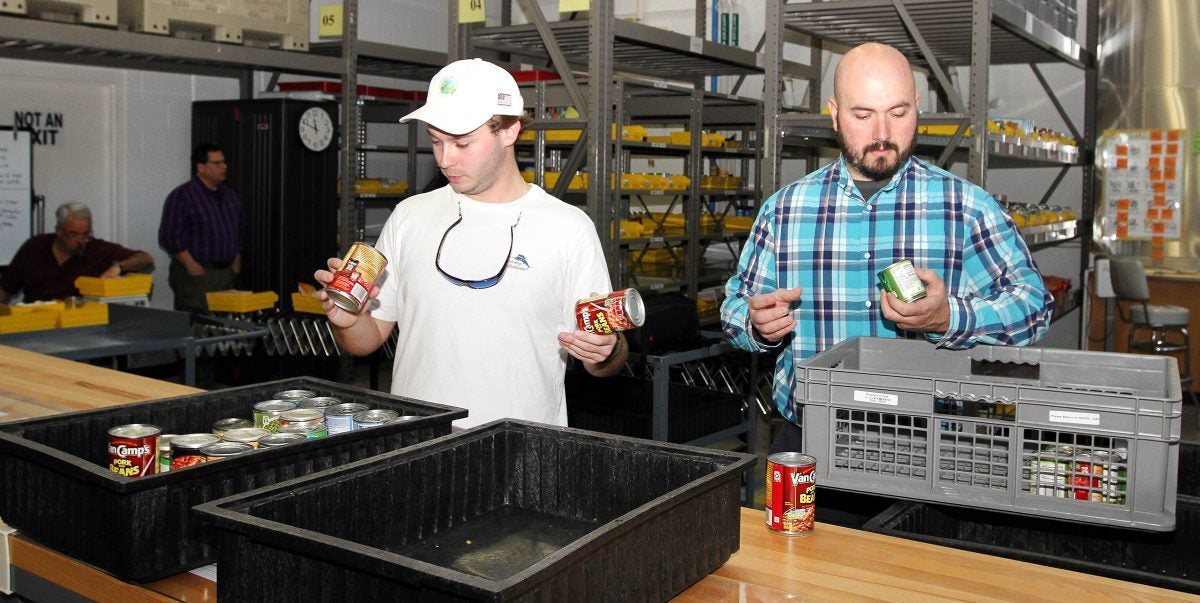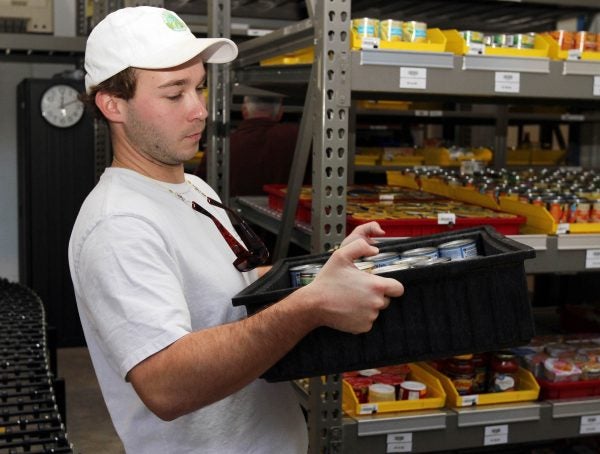Purple Pantry, new service lab ready to support students
The Purple Pantry targets food insecurity on the campus of East Carolina University, and now in its second year, it has experienced an increase in the number of students it serves.
Still, organizers know the holidays can bring extra financial burdens to students who may be trying to balance their budgets at the risk of getting healthy meals.

From right, student Robert Green, teaching instructor Scott Abney, and associate professor Mark Angolia sort food donated for the Purple Pantry in the student service learning lab in the Science and Technology Building at East Carolina University. (Photos by Ken Buday)
Jarmichael Harris, coordinator of ECU Collegiate Recovery Community whose student volunteers run the pantry, said the pantry served about 40 people during the fall semester of 2018. Now that the pantry has relocated to the basement of the Main Campus Student Center, it sees nearly that number every month.
“We’re now serving about 25 to 30 students per month,” Harris said. “Students can come in, show their 1Card and shop as they need to. The average student usually takes about 8 to 10 pounds of food per visit, and there is no limit on the amount of food they can take.”
The pantry is designed to provide free nonperishable food to ECU students. It has personal hygiene items as well.
“This service is very much in need on college campuses across the country,” Harris said. “The Purple Pantry not only provides proper nourishment to our students, but also lets them know that ECU understands their situation and needs.”
The pantry has gained an ally in its battle against food insecurity in the form of a new student service learning lab designed to simulate many of the concepts from the Industrial Distribution and Logistics (IDIS) degree program.
The lab, located in the Science and Technology Building, will serve as a central warehouse for food reserves for the pantry. Student volunteers will operate the lab, running it much like any distribution center they would encounter in business and industry.
JDA Software, headquartered in Arizona, is donating computer software for the lab through its University Gifting Program. Open Sky Group, headquartered in Fuquay-Varina, is donating services to implement the JDA Warehouse Management software that will help the students track the food from the time it is donated through the time it is shipped to the pantry, and eventually, picked up by the students.

Student Robert Green, left, and teaching instructor Scott Abney sort food in the student service learning lab.
“This is an exciting project for Open Sky Group,” said Jason Yantiss, vice president of client services for Open Sky Group. “It’s important for us as a company to give back to the communities in which we work and live. When we can combine that with what we love to do best — improve processes and implement software — that really makes our day. We’re looking forward to what we can achieve together with the students and professors at ECU to not only give them real world business experience, but also benefit those who might otherwise struggle to get the nourishment they need.”
The lab is in a developmental startup mode, with a goal to get the operation up and running with the implementation of the new software in the spring semester.
“We’re happy to provide software for this effort at ECU as part of our efforts to expose students to our industry-leading supply chain solutions,” said Wayland Fox, senior director of product management at JDA. “Hands-on training is an incredibly valuable way to help them understand supply chain concepts and apply them to their career skills and pursuits when they graduate. JDA encourages giving back to the community and allows associates to volunteer time throughout the year for charitable causes. Providing software for the Purple Pantry is another way we can give back and help students in need.”
Donated food started arriving at the lab in November. Student volunteers have been sorting the food, checking expiration dates and conducting quality control for potential food damage.

Student Robert Green carries a bin of food donated for the Purple Pantry in the student service learning lab.
ECU Transit has also agreed to support operations by delivering donations to the lab and transporting food to the pantry so its shelves can be restocked.
Dr. Mark Angolia, associate professor and IDIS program coordinator, said the idea behind the lab is for students to help students while fostering the university’s academic and service missions. It’s also bringing the ECU community together with multiple departments supporting an effort to ensure students can overcome food insecurity.
“Service is our motto,” Harris said. “We consider ourselves a service institution.”
The pantry is regularly open from 1-5 p.m. Monday through Friday. Holiday hours may vary. For more information, visit https://collegiaterecovery.ecu.edu/purple-pantry/.
-by Ken Buday, University Communications